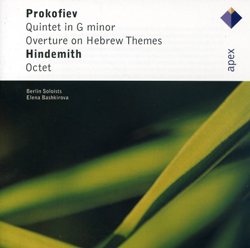
Prokofiev: Quintet, Overture on Hebrew Themes, Hindemith: Octet
Berlin Soloists
Apex/Teldec, recorded 1993
Buy at Amazon.com
here
or
here
One of Prokofiev's most unusual pieces
Prokofiev's reputation is built largely on his music for orchestra, often with voices or solo instruments added. The piano sonatas are also important contributors to the composer's stature, but the man left us surprisingly little chamber music. Of this latter, most famous is the flute sonata, long ubiquitous in auditions and student recitals to the point of becoming cringeworthy. Another popular item is the Overture on Hebrew Themes for clarinet and piano quintet, though in its simplicity it doesn't sound much like stereotypical Prokofiev. There are also two string quartets and some pieces for violin, cello and piano in various combinations. And then there's the Quintet, Op. 39 from 1924. Commissioned by a dance troupe for the unlikely combination of oboe, clarinet, violin, viola and double bass, it offers Prokofiev in his experimental mode as exemplified by the contemporaneous Second Symphony. This piece is the closest Sergei ever got to the sound world of Pierrot Lunaire and L'histoire du Soldat, and it's possibly the most unique piece in all his output.
The most disorienting feature is the instrumentation: lacking orchestral timbres, percussion or a piano part, the music seldom resembles the Prokofiev we all know and love. An exception comes right at the outset, though, in the form of a gavotte-like oboe tune that could easily have come from one of the composer's contemporaneous orchestral dance scores.
This forms the theme of a brief theme and variations movement in which the mixed chamber ensemble milieu soon starts to predominate. This viola lick starts the first variation, for example, emphasizing the fourths in the oboe theme:
One of the defining features of the Quintet is Prokofiev's use of a double bass in lieu of a cello. It frequently appears as an ominous bottom to this otherwise trebly ensemble, making the piece a rather important entry in the sparse repertory of conventional chamber works with bass parts. Listen to the chunky solo that starts the second movement, and hear how often the double bass plays entirely separately from the other two string instruments.
This second movement, an Andante unabashed in its dance rhythms and quite chromatic in its harmonic language, approaches the sound world of Schoenberg's Serenade, Op. 23. I don't know if Prokofiev had heard it, though he surely would have been familiar with Pierrot Lunaire, which kicked off the 20th century craze for the "poor man's combo". The 5/4 time third movement, on the other hand, is more closely reminiscent of neoclassical Stravinsky, perhaps showing the influence of his Octet, completed (like Schoenberg's Op. 23) in 1923.
Next up is an Adagio Pesante with static, grinding rhythms in the strings which accompany a slow, astringent oboe melody with a narrow compass:
Clarinet and violin soon join in imitation. It's akin to both the oboe theme from the Second Symphony's finale, and to the Factory Dance from Pas d'acier. But it may remind you more of a composer like Honegger than anything else in Prokofiev's output.
The fast, short fifth movement emphasizes the double bass again. Frequently it plays pizzicato in contrast to the other (bowed) string instruments. The opening passage, recalled four times as a mini-refrain, seems to anticipate the presto delirando movement from Berg's Lyric Suite, completed in 1926. Though this movement strikes me as having the character of a finale, it's in fact followed by a sixth movement that begins with an Andantino reminiscent of the music that opens the first movement. A gigue-like middle section features a tune played by violin and bass several octaves apart, then concludes with some of the most chromatic/atonal writing to have come from Prokofiev's pen. A truncated reprise of the Andantino follows, leading into to a coda that reprises the rhythms of the gigue.
This album from the Berlin Soloists also features the aforementioned Overture on Hebrew Themes as well as Hindemith's Octet for winds and strings, a fairly late work (1958) that's just what you'd expect from that composer, right down to the bravura solo viola passage that ends the fugal finale (Hindemith played this part himself at the work's premier). But I would recommend this album for the Prokofiev Quintet, especially if you're a Prokofiev enthusiast who hasn't yet gotten to know it.
- First published April 2016
![]()
Selected writings |
Schellsburg home
Jerry Hunt |
cribbage
![]()
Original Material and HTML Coding Copyright © 2016 by
Michael Schell. All Rights Reserved.



